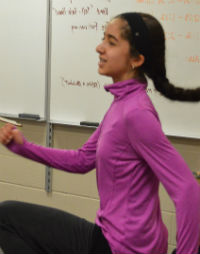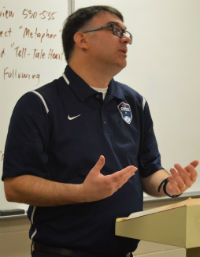Mike Swift flipped off the lights in his eighth-grade language arts classroom. He momentarily went into the hall, cracked open the door and peered in, staring.
His students shrieked. Swift had created an image they are not likely to forget when they read the lines in Edgar Allen Poe’s short story “The Tell-Tale Heart:” “Every night about twelve o’clock I slowly opened his door. And when the door was opened wide enough I put my hand in, and then my head.”
Swift had just read the story aloud, moving chairs and pounding his podium as the tale unfolded, his voice sounding maniacal at times.
Moments later, he questioned the class about the pounding heart the narrator hears that drives him to confessing murder. Whose heart was he hearing?,Swift asked. He then had students run in place and do jumping jacks to get their hearts pounding. Could they hear their own hearts, or would that be crazy?
Swift is a popular guy at Mill Creek Middle School. When asked what teacher inspires them to work hard, students repeatedly mention “Mr. Swift.” They fist bump and high five him in the hallway.
What Swift does is challenge them to think, they say, to dissect meaning from what they read, whether it’s a creepy Poe story or Abraham Lincoln’s famous Gettysburg Address.
“One of the things I try to teach all students to do is, regardless of what Common Core (the national set of academic standards) wants us to do, the end goal is that we all need to think,” he said.

The Think Chair
Swift invites students to sit next to his desk in the Think Chair, a former library chair designed by his sister with the word “Think.” on it, and talk about whatever is on their mind.
“Every day, either at the beginning or the end of class, someone will sit in that chair and want to talk to me. It could just be about being on the basketball team or about personal issues at home. I mostly spend time listening and trying to be supportive.”
Eighth-grader McKenna Bent often sits in the chair and talks to Swift. She said she loves his class.
“Most of us can’t just learn from a teacher talking and writing stuff on a board. He actually gets everybody involved and he’s very active,” McKenna said. “He makes me think of things in a different way and to think more about things.”
Peyton Gilbert also likes to use the Think Chair. “It’s really nice to have someone to talk to.”
The class has an energy that helps her understand the literature, she said. “We learn while we are having fun. By putting things in a fun way, we remember it more.”
Swift, who has taught language arts and gym in Comstock Park Public Schools for 20 years, including for the past five as a middle-school language arts teacher, knows it’s important for students — for everyone — to express their feelings.
| Know a rockstar teacher? Let us know who and why, and they could be featured in School News Network! Email SNN@KentISD.org |

“I do believe it’s not just about work. Students are not just numbers and they are not just scores,” he said. “It’s very easy in this world, regardless of standardized test scores, to forget that. It’s the whole social media age. It’s very important for people to remember that they’re people. That they’re human.”
Literature offers a plethora of ways to remind people of their humanity. “I try to get them to understand that through the characters and situations that unfold in the story they might be able to see a connection to their own lives,” Swift said.
Principal Gus Harju said he sees Swift’s classroom as a place where deep learning becomes possible.
“He has the ability to transform students into the setting of what they’re reading or writing. Through combining questions of both lower and higher order thinking skills, he builds excitement for learning,” he said.
Swift is in tune with students’ needs and uses different approaches with each of them, Harju added. “I believe this individualized attention adds to the enjoyment of students being in his class.”
Subjects seem to merge in Swift’s class. Literature often serves as a lesson in history and can be applied to current events. In looking at documents like the Gettysburg Address, he asks students to think about its applications to today.
“If we look at our political candidates today, we have to be able to think about what they’re saying. Are they trying to inspire us to be a better nation, or do they have a different agenda? Students have to pay attention to that stuff around them, and think.”
He encourages students to take risks with their opinions: out loud, on paper or even in their own heads.
“Think,” he reiterates.

No Walls, No Bolts, No Locks
Swift also encourages young people to have big expectations, that the world is for them to explore and learn from. The class read the play, “The Diary of Anne Frank” and were astounded by the depth of Frank’s writing, who was just 16 when she died.
“Anne, through no fault of her own, was caught being unable to live her dreams and live as other kids live,” Swift said. “So, sometimes in our lives, we get caught in situations where the consequences that we have to live with aren’t of our making. How can we learn from Anne Frank to accept our present but possibly hope for something better?”
Again, the answer is: think. “There are no walls. There are no bolts. There are no locks that can imprison your mind,” he told the class, quoting a line from the play.
He also challenges students to think about invisible barriers that may hold them back.
“Anne Frank had the same amount of time in a day that you do,” he told them. “What do we do with our time? Do we fill our time with thinking, or with moving our finger on our screens? It’s very easy to get distracted from the uncomfortable thoughts that fill our silences.”
CONNECT
The Tell-Tale Heart









